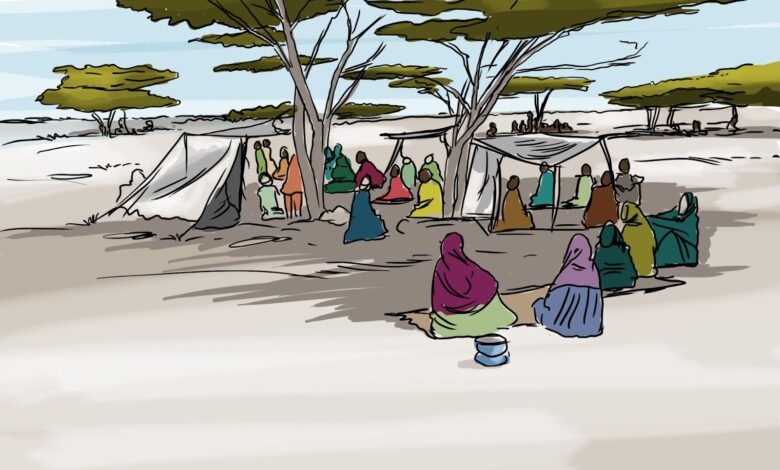Resettled Displaced People In Northeast Nigeria Lament Lack Of Water, Toilets
Displaced people who have been resettled in Nguro Soye in Borno state, Northeast Nigeria, have resorted to open defecation due to inappropriate water and sanitation hygiene facilities.

Lack of water and sanitation facilities in resettlement camps in Borno, Northeast Nigeria, is forcing internally displaced people being resettled there to defecate in the open.
Facilities that were unfinished when people arrived many weeks ago at Nguro Soye, a community in Bama Local Government Area (LGA), remain unfinished, the displaced people said.
Hafsat Lawal, 40, told HumAngle that since they were resettled over two months ago, the living conditions have been dire, but the most dreadful part is their lack of clean water and toilet facilities.
“They started building the toilets before we came, but they have still not finished it till today,” she says. “We have to trek to Budumri to fetch water before we can use it.”
In Apr. 2021, the Borno State Governor, Babagana Zulum, flagged off the construction of 500 houses in Nguro Soye as part of his efforts to resettle internally displaced persons (IDPs) who had earlier fled from the insurgency across the state. However, these resettlement efforts have been faulted especially by resettled IDPs who describe it as a ‘second displacement’ due to the living conditions being no better than when they were in displacement camps.
Some even say that their stay in displacement camps was relatively easier before the ban on relief materials distribution.
Lack of potable water, clean toilets, and sanitation utilities remain a major challenge for women and girls, especially those without means of privacy. According to a Business Day report, women could encounter worse conditions, such as infections, harassment, rape, or even abduction, especially in resettlement camps where insurgent groups still hold sway.
Zara, 35, who was also resettled in Nguro Soye two months ago, said that when they want to ease themselves, they use polythene bags which are unsafe to them, especially with the number of people that keep getting sick.
“We can spend two days without water. Sometimes we contribute ₦20 each to fuel the generator that starts the pumping machine for water, but before we are able to fetch, the fuel has finished,” Zara said.
Abubakar Bulama, also a recently resettled IDP, told HumAngle how even when they contribute money so water could be pumped, they are made to wait. In some instances, he says, a fight would break out before they can fetch, “the humiliation is just too much.”
Open defecation could also worsen the outbreak of infectious diseases, especially with the lack of drinking water in the resettlement areas. According to a UNICEF report, 73 per cent of diarrhoeal and enteric diseases are associated with poor access to water, sanitation and hygiene and disproportionately affects women and children.
In September, the Borno state authorities revealed that at least 43 people had died from a cholera outbreak across seven communities, including Bama, where the IDPs had been resettled.
Women who engage in open defecation are also confronted with compromising their dignity and menstrual and maternal health.
Support Our Journalism
There are millions of ordinary people affected by conflict in Africa whose stories are missing in the mainstream media. HumAngle is determined to tell those challenging and under-reported stories, hoping that the people impacted by these conflicts will find the safety and security they deserve.
To ensure that we continue to provide public service coverage, we have a small favour to ask you. We want you to be part of our journalistic endeavour by contributing a token to us.
Your donation will further promote a robust, free, and independent media.
Donate HereStay Closer To The Stories That Matter




